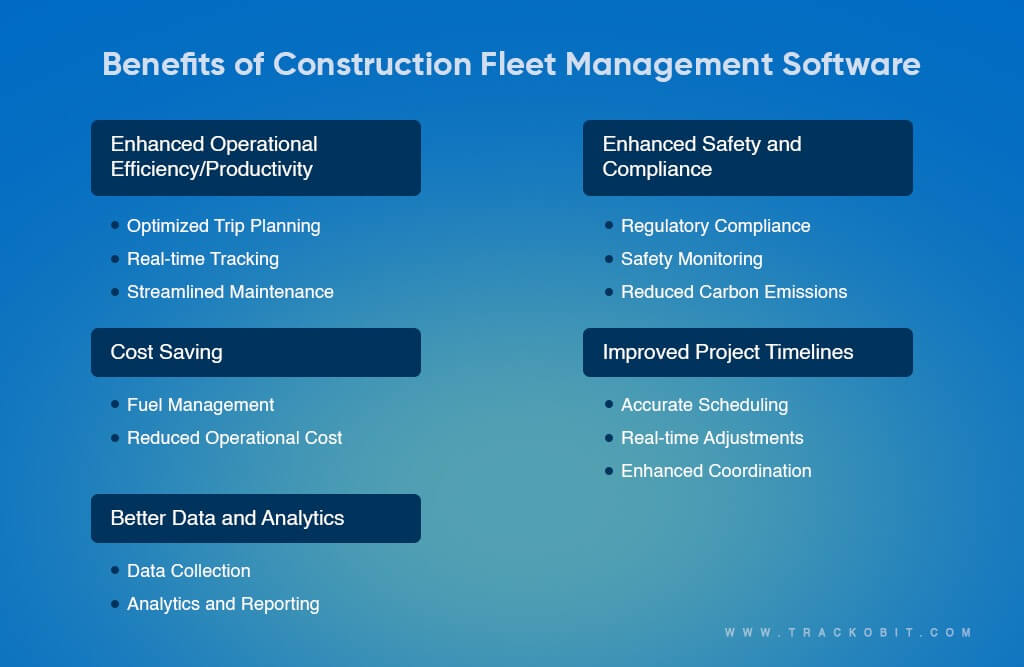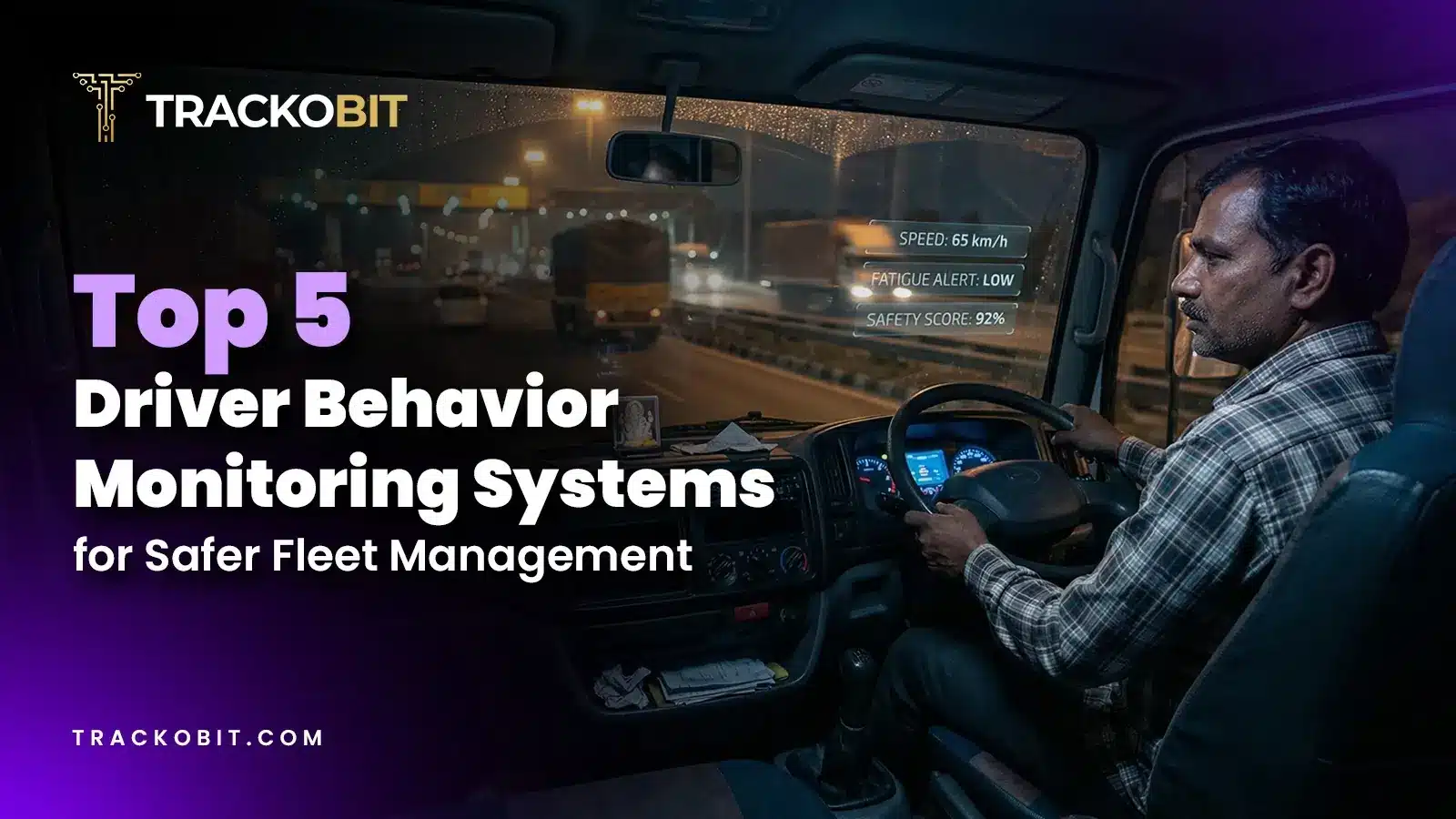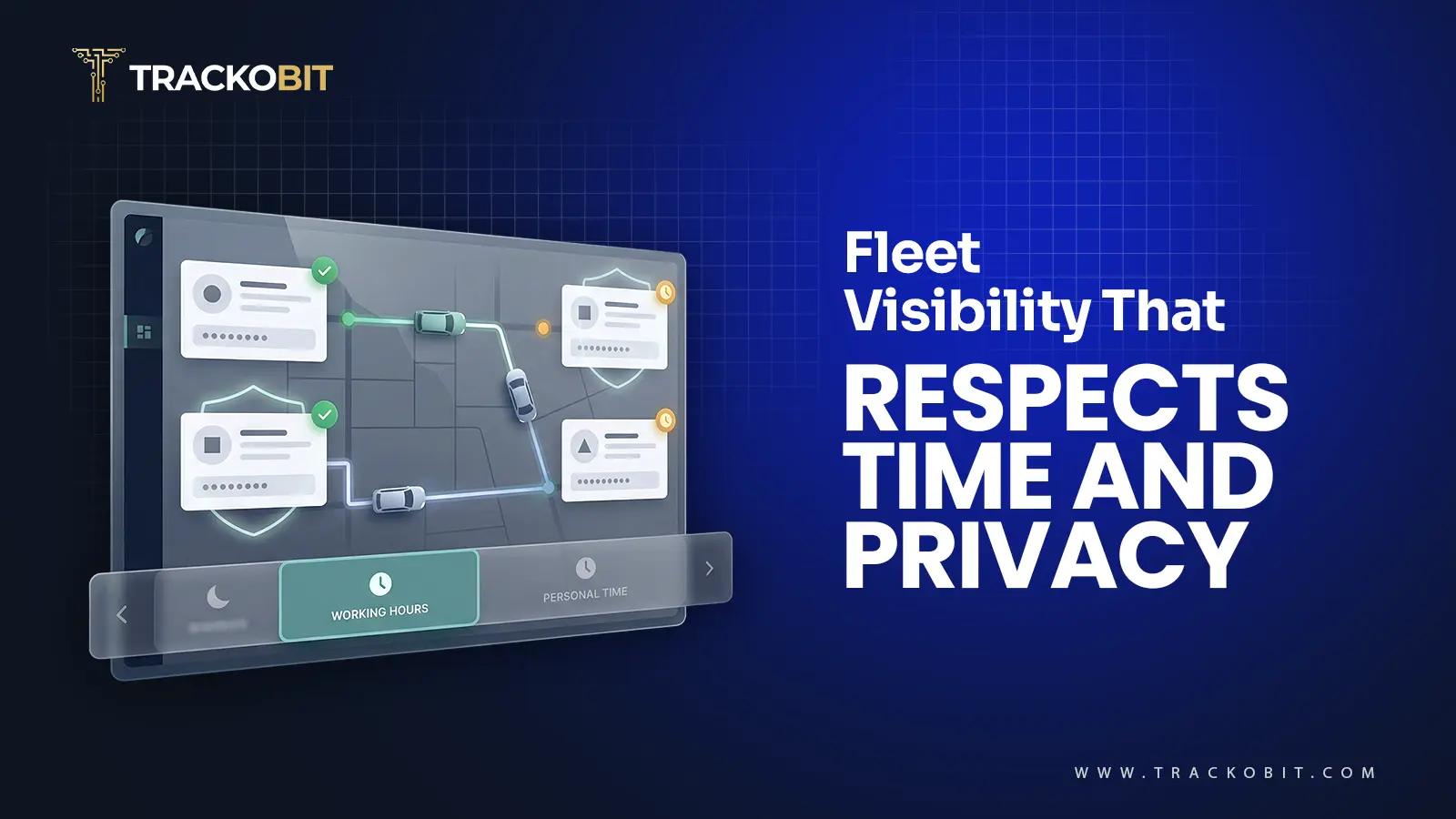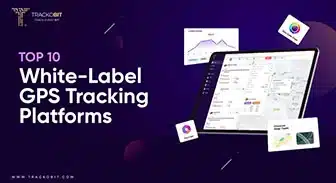-
TrackoBit
Manage commercial vehicles with the new-age Fleet Management Software
TrackoBit -
TrackoField
Streamline your scattered workforce with Field Force Management Software
TrackoField -
Features Resources
-
Blog
Carefully curated articles to update you on industrial trends. -
White Paper
Insightful papers and analysis on essential subject matters. -
Glossary
Explore an alphabetical list of relevant industry terms. -
What’s New
Get TrackoBit & TrackoField monthly updates here. -
Case Study
Explore the cases we solved with our diverse solutions. -
Comparisons
Compare platforms, features, and pricing to find your best fit.
-
About Us
Get to know TrackoBit: our team, ethos, values, and vision. -
Careers
Join the most dynamic cult of coders, creatives and changemakers. -
Tech Support
Learn about our technical support team and services in detail. -
Events
Check out the exhibitions where we left our marks and conquered. -
Contact Us
Connect with us and let us know how we can be of service.
What are the Benefits of Construction Fleet Management Software?
- Author:Anvesha Pandey
- Read Time:7 min
- Published:
- Last Update: August 21, 2024
Table of Contents
Toggle
Want to know the benefits that come with construction fleet management software? This guide provides detailed information on the benefits of investing in fleet management software for construction businesses seeking to maintain 100% visibility.
Table of Contents
Toggle
Well, before we start this piece of writing- let us ask you a question- Do you ever wonder how construction companies effectively manage projects while minimizing delays, staying on budget, and ensuring successful completion?
A big part of the secret lies in managing the construction fleet effectively. But with dozens of trucks, excavators, and crew members, how do you keep everything running smoothly?
The answer to this is construction fleet management software. This piece is all about construction fleet management software and its benefits.
For your assistance, we also have briefly unfolded what are fleet management systems in the construction industry.
Find out why 700+ small, medium and large businesses automate fleet management with TrackoBit.
What is Fleet Management in the Construction industry?
Fleet management in the construction industry involves systematically administering and coordinating a company’s vehicle, equipment, and machinery used in construction projects. Efficient management ensures that all fleet assets are efficiently utilized, maintained, and managed to optimize operational performance, reduce costs, and enhance productivity.
Here’s an overview of what fleet management software in the construction industry entail –
✅ Monitoring Engine Hours & Fuel Management
✅ Fleet Vehicle Maintenance & Repairs
✅ Meeting Compliance & Safety
Now that you know exactly what fleet management is in the construction fleet industry, without any further ado, let’s get straight into the benefits you get with the system.
Benefits of Construction Fleet Management Software

1. Enhanced Operational Efficiency/ Productivity 📈
Enhancing the efficiency of the construction fleet is one of the primary goals of businesses. This goal can be achieved by making the most effective use of resources (both mobile assets and workforce) to complete tasks within time, minimize downtime and wastage of resources. Construction fleet management software helps enhance the productivity and efficiency of your fleet with features like-
- Optimized Trip Planning- Modern-day construction fleet management software helps allocate trips, set halts, and plan efficient routes for construction vehicles and equipment to ensure they reach their destination on time.
- Real-time Tracking- The software helps monitor the location of the assets, update the status of vehicles, receive alerts for route deviation, and collect data based on usage and efficiency.
- Streamlined Maintenance: Maintenance of a construction fleet becomes crucial as it ensures vehicles and equipment are serviced regularly, preventing breakdowns and extending their lifespan.
2. Cost Savings 💰
Cost saving in fleet management for the construction industry depends on strategies to reduce expenses associated with the operational and maintenance of vehicles and equipment. This involves monitoring fuel consumption, maintenance expenditures, and more. An ideal fleet management system helps curb costs by:
- Helping Plan Efficient Routes – The software allows fleet managers to plan the most economical trips consisting of efficient routes. This prevents more vehicles on the road.
- Allowing Effective Fuel Management – Construction fleet management software helps in tracking fuel usage and identifying inefficient routes or excessive idling times.
- Reduced Operational Cost – Fleet management construction software facilitates cost savings through streamlined operations and optimized resource utilization. By providing real-time tracking of vehicles and equipment, the software enables companies to identify inefficient routes, reduce fuel consumption, and minimize vehicle downtime through proactive maintenance scheduling.
3. Enhanced Safety and Compliance 🧑⚖️
Fleet management software helps maintain safety and compliance to minimize any potential accidents, legal consequences, or financial losses in fleet management for construction.
This involves the below-mentioned points
- Regulatory Compliance
Fleet management software ensures that all vehicles and machinery comply with federal regulations. For instance ELD compliances, AIS 140 Guidelines, and more.
- Safety Monitoring
With the utilization of GPS tracking systems, fleet managers can monitor the locations and routes. Additionally, they can draw virtual boundaries aka Geofences. Once the equipment leaves a predetermined perimeter, managers will receive an alert in case of misuse or theft. GPS sensors and telematics can also be used to monitor road behavior and educate drivers on safe driving practices.
- Reduced Carbon Emission
Route planning software which is an inherent part of fleet management software, helps in the reduction of unnecessary mileage, idling, emissions, and emissions. Thereby reducing CO2 emissions. Optimizing routes can improve fuel efficiency by up to 30% on highways and up to 40% in stop-and-go traffic (Element Fleet Management).
4. Improved Project Timelines 🚧
Enhancing project timelines in construction fleet management involves ensuring accuracy in scheduling, enabling real-time adjustments, and fostering enhanced coordination between the fleet manager and working staff- all of this can simply be enhanced with the help of an ideal fleet management software.
These strategies lead to more efficient project execution and timely completion.
- Accurate Scheduling
Fleet management software allows for efficient planning and allocation of vehicles and equipment based on the requirements of the project. By creating a realistic and detailed schedule, you minimize delays caused by scrambling for resources at the last minute.
- Real-time Adjustments
Unexpected situations are a reality in construction. Traffic jams, equipment breakdowns, or changes in material delivery schedules can throw a wrench in the works.
Fleet management systems with real-time GPS tracking and communication features allow for quick adjustments.
- Enhanced Co-ordination
Fleet management software can facilitate this by providing a central platform to share updates, track deliveries, and ensure everyone has the latest information. This eliminates confusion, wasted time, and delays caused by miscommunication.
5. Better Data and Analytics 📊
Utilizing better data and analytics in fleet management enables informed decision-making, efficient operations, and strategic planning.
- Data Collection
Fleet management software eliminates manual data entry as it collects data from various sources like GPS trackers, vehicle sensors, and driver apps. This data can include.
📌Vehicle location and speed
📌Fuel consumption and idling time
📌Route taken and distance traveled
📌Driver behavior (harsh braking, acceleration)
- Analytics and Reporting
Fleet managers can generate reports on a variety of aspects, such as individual driver performance, fuel usage trends, and exceptions (like unauthorized stops or speeding events). These reports can be easily exported for further analysis.
6. Technology Integration and Innovation 🖥️
Technology plays a very pivotal role in the modern fleet management industry. Innovations like GPS tracking, predictive maintenance, and autonomous vehicles are surely reshaping the industry. A forward-thinking approach to technology integration ensures construction companies stay competitive and future-ready.
To sum up, real-time tracking changes the way the construction fleet is managed.
The Future of Construction Fleet Management
The future of the construction fleet industry is driven by technological integration as we can see a lot of new trends coming all along the way. The future promises even more sophisticated technologies, greater connectivity, and enhanced data analytics.
Here are some key trends to watch:
AI and Machine Learning (ML)
Advanced data analytics powered by AI and ML will unlock deeper insights from fleet data. Predictive maintenance will become even more sophisticated, allowing for proactive interventions and preventing costly breakdowns.
According to the study by MarketsandMarkets – By 2025, the global AI in construction market is projected to reach $2.1 billion, with a compound annual growth rate (CAGR) of 35.1% from 2020 to 2025.
Autonomous Vehicles
While fully autonomous construction vehicles might be some time away, expect to see increased use of semi-autonomous features like automated loading and unloading or self-driving haul trucks in controlled environments.
Additionally, autonomous vehicles can reduce construction project timelines by up to 20% through improved productivity and optimized operations.
Drones and Robotics
Drones will play a bigger role in site inspections, surveying, and progress monitoring. Construction robots might assist with repetitive tasks, improving safety and efficiency.
Connected Job Sites and IoT (Internet of Things)
Construction sites will become increasingly connected, with sensors embedded in equipment and materials, creating a real-time flow of data for better decision-making and improved safety.
Moreover, IoT-enabled sensors and devices on construction equipment can improve asset utilization by up to 25% and reduce maintenance costs by 30%.
Focus on Sustainability
Expect to see a growing emphasis on eco-friendly practices. Fleet management software will help optimize routes and fuel consumption, while electric and alternative fuel vehicles might become more prevalent.
Hence, after research by Navigant Research, it was proven that investment in electric and hybrid vehicles for construction fleets is projected to increase by 23% annually, driven by the desire to reduce carbon footprint and comply with stricter emission regulations.
Overall, these advancements, coupled with real-time tracking and data-driven decision-making, will lead to enhanced efficiency, improved safety, greater sustainability, and more.
Read Blog – What is Fleet Maintenance?
Conclusion
The role of construction fleet management software in the modern construction industry cannot be overstated. It serves as the backbone of efficient project management, offering ample benefits that range from enhanced operational efficiency and cost savings to improved safety, compliance, and project timelines.
By using advanced technologies like real-time tracking, data analytics, and AI-driven insights, construction companies can streamline their fleet operations and more.
Additionally, the future of the construction fleet management industry has a lot more to look forward to. Emerging trends such as AI, autonomous vehicles, drones, IoT, and a heightened focus on sustainability are reshaping the fleet management industry. These innovations will surely revolutionize how construction fleets are managed, leading to efficiency, safety, and sustainability.
So, are you ready to transform your fleet operations and build a future of success?
If yes, join forces with TrackoBit’s construction fleet management software. The system not only streamlines operations but also significantly enhances safety and overall efficiency, resulting in customer satisfaction and a more competitive and profitable business.
For more info
Talk to our experts today!
Anvesha is a communication specialist at TrackoBit. With a strong background in media and communications, she adds much-needed balance and brevity to TrackoBit’s... Read More
Related Blogs
-

5 Best Driver Behavior Monitoring Systems for 2026
Tithi Agarwal February 23, 2026Having the best driver behavior monitoring system is a necessity as it helps you ensure driver safety and optimize operational…
-

Why is Driver Drowsiness Detection System Important for Fleet Management?
Shemanti Ghosh February 4, 2026A driver drowsiness detection system is critical for fleet management. It helps prevent fatigue-related accidents and reduces operational risks through…
-

When Tracking Needs a Clock: Rethinking Fleet Visibility
Tithi Agarwal December 24, 2025Read on to understand why fleet tracking works better when it follows working hours. Because visibility should support operations, not…
-

What Makes TrackoBit’s Video Telematics Software Truly Next-Gen?
Shemanti Ghosh December 17, 2025TrackoBit’s video telematics software blends smart video intelligence with full server control. The result? Superior fleet reliability and safety.

Subscribe for weekly tips to optimize your fleet’s potential!
Your inbox awaits a welcome email. Stay tuned for the latest blog updates & expert insights.
"While you're here, dive into some more reads or grab quick bites from our social platforms!"Stay Updated on tech, telematics and mobility. Don't miss out on the latest in the industry.
We use cookies to enhance and personalize your browsing experience. By continuing to use our website, you agree to our Privacy Policy.





































